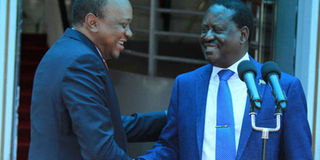Governors should ‘spread’ handshake

President Uhuru Kenyatta (left) and Nasa leader Raila Odinga conclude a joint press conference at Harambee House, Nairobi, on March 9, 2018. They endorsed the reconciliation deal. PHOTO | JEFF ANGOTE | NATION MEDIA GROUP
What you need to know:
- We must be aware that reconciliation is compromise and the recognition that one must give in order to take.
- We should use this opportunity to push for regularised disbursements and hold honest discussions on the economic sustainability of devolution.
With a handshake, our two most powerful leaders recently set the country on a journey that it has never been on in 50 years or so, with an announcement that they had buried the hatchet.
The magic of the meeting between President Uhuru Kenyatta and opposition chief Raila Odinga two weeks ago has seen the national political temperatures plummet to the lowest point.
Hardline Jubilee Party leaders are now referring to Mr Odinga as “Njamba” — Kikuyu for statesman.
Dholuo radio station Ramogi FM has been referring to Mr Kenyatta as “Ouru Jaseme”.
After just a few days of the truce, we are at that point of discussing how a historic handshake can influence politics and promote nationalism and patriotism.
RECONCILIATION
Since the disputed General Election on August 8, last year, I have been among the moderates calling for dialogue and reconciliation between President Kenyatta’s and Mr Odinga’s supporters to save the country from sinking into further political and economic abyss.
On January 20, I caused a political ruckus when, at the burial of former KTDA chairman Stephen Imanyara in Meru County, I called for unity talks between the two erstwhile arch-rivals.
Although it seemed impossible, the two national leaders have given us the challenge of embracing this ‘impossibility’.
As governors, we must take the unity message from the streets of Nairobi to all the corners of the 47 counties.
UNITY MESSAGE
Whereas President Kenyatta and Mr Odinga can push the agenda nationally, and as the team appointed by the leaders sits down to chart the way forward, we have to be their champions in our jurisdictions.
Together with other leaders, we must champion this new path for our country.
We, county leaders, can push this agenda through public barazas, media appearances and town hall meetings, as well as by embracing our political “enemies”.
We can also form national healing teams by promoting dignity, prosperity and security.
The Senate has taken the lead in promoting unity talks. During a session, the senators gave the thumps-up to the truce and promised to rally Kenyans behind it.
Our case may seem insurmountable but there are other handshakes that changed history.
PEACE TREATY
In 1865, General Ulysses S. Grant shook hands with General Robert E. Lee, after which the latter announced his surrender, ending the terrible war between the Union and the Confederacy in the United States.
The symbolic handshake between Egyptian President Anwar Sadat and Israeli Prime Minister Menachem Begin marked the end of a bitter 30-year war between their countries after the signing of the 1979 Egypt-Israel Peace Treaty.
In 1993, Israeli Prime Minister Yitzhak Rabin and the Palestinian Liberation Organisation (PLO) chairman, Yasser Arafat, shook hands in the first face to face agreement between the two belligerents.
United States President Barack Obama shook hands with Cuban leader Raul Castro in 2013, the first such public gesture at that level since the Cuban Revolution.
DETRACTORS
South Africa’s anti-apartheid icon Nelson Mandela publicly embraced his former jailor, President F. W. de Klerk, paving the way for the ‘Rainbow Nation’.
Things won’t be easy in Kenya, though. Mr Odinga will have to become a manager of the inevitable in dealing with his camp in his drive for reconciliation.
The ODM leader should, however, never be afraid of losing his political base by joining hands with President Kenyatta: He will, eventually, emerge much stronger.
Soviet leader Mikhail Gorbachev lost Russia and all its colonies but he is still admired, while President de Klerk lost the richest country in Africa but went on to share the Nobel Peace Prize with Mr Mandela.
DEVOLUTION
In his move, Mr Odinga has pointed to that scarce and undervalued ingredient in politics: The strength to “stand down” when the time comes.
President de Klerk said about his career that “politics, in essence, is about power, and the attainment and exercise of power nearly requires compromise”.
It’s now upon us to join and support Mr Kenyatta’s and Mr Odinga’s dream.
For the counties, we should use this opportunity to push for regularised disbursements and, most importantly, hold honest discussions on the political viability and economic sustainability of devolution.
But we must be aware that reconciliation is compromise and the recognition that one must give in order to take.
Political action on this basis reflects the highest political virtue in life.
Mr Nyagarama is Governor of Nyamira County. [email protected]




